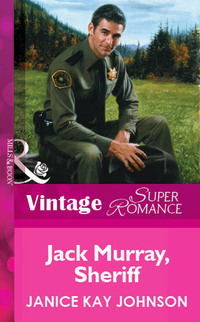
Полная версия
What She Wants for Christmas
He couldn’t afford to acknowledge his attraction to her or the spark of interest he’d seen in her dark eyes.
Sandwich, he reminded himself, before his glance strayed again to her kitchen window. He grunted and turned toward the driveway where his pickup was parked. Rounding the house, he walked right into her.
Joe reached out and grabbed her before she went tumbling. Eyes wide, she looked up at him. “I’m sorry! That was dumb. I wasn’t watching—”
“I don’t know who was dumb,” he interrupted. “I’m the one who almost ran you down.” Reluctantly he let her go. Her shoulders felt as fragile under his hands as she’d declared her psyche to be. “Did you come out to see our progress?”
“Well, actually—” her tongue touched her lips “—I came out to invite you and your men in for lunch.”
He had trouble not staring at her mouth. “They went into town.”
Damn, she was beautiful, tiny, with these huge brown eyes and delicate features emphasized by the severity of the French braid that confined her dark hair. But it was neither the tiny nor the beautiful that got to him; it was the defiance in her eyes, coupled with the smile that played most of the time at one corner of her mouth.
“Well, then.” She met his gaze boldly, though now her cheeks were touched with pink. “Can I talk you into lunch?”
“You don’t need to cook—”
“I already did. Homemade minestrone soup and fresh-baked bread.”
“I’m too dirty to come in.”
“You can take your boots off.”
What could he say? A moment later he padded in stocking feet into her bathroom to wash his hands. Waiting for the water to warm up, he frowned at his image in the mirror. What the hell did she see in him? All that met his eyes were dirty denim, callused hands and a haircut that was long on function and short on style. She’d discover soon enough that his conversation could be summed up about the same way.
But, by God, at least he was clean when he returned to the kitchen. She’d set the table there: two quilted place mats, a glass jar of spiky asters and late daisies, stemmed water glasses, silverware laid out properly, with an extra fork for some unseen dessert. It was pretty—and made him feel awkward. Only the sight of her black Labrador lying under the table belied the formality.
Her eyes touched his face and shied away. “You’re my first guest in this house. I thought I’d celebrate.”
He nodded and sat down while she ladled steaming fragrant soup into his bowl and offered him slices of crusty warm bread.
“Would you like a beer?” she asked, and he relaxed a little. At least she wasn’t pouring French wine.
“No, thanks. I don’t drink when I’m going to operate a chain saw or heavy equipment.”
“Oh. No, of course not.”
“I haven’t seen a woman blush in a long time,” he heard himself say.
That did it. Her cheeks were now as rosy as though a winter freeze were biting at them. But she also laughed.
“I don’t usually blush. I think it must be you.”
Him? What was she saying? If she’d been any other woman, he would have known, but her? Why him?
“I’m sorry if I’m making you uncomfortable,” he said clumsily.
He almost thought he heard her sigh. “Are you married?” she asked.
His heart did a peculiar heavy-footed dance in his chest. “No.”
Her cheeks hadn’t faded one iota. “Engaged or…or…”
He helped her out. “No.”
“Oh.”
A slow smile was growing on his face. “Are you going somewhere with this, ma’am?”
“I’m just curious,” she said with dignity.
He laid down his butter knife and said quietly, “Good.”
Their eyes met and held for a long quivering moment. The breath of air he sucked in seared his chest.
“I know you’re not married,” he said. “Are you divorced?”
“Widowed.” Pain, or at least regret, twisted her mouth. “Five years ago. My husband was an idiot. He made an ultra-light from a kit. He was flying it when it drifted into some electrical wires. The day was windy—” She snorted. “But he had to go up.”
“You didn’t approve of his hobby, I take it.”
“I hated it!” He felt her tension. “I haven’t forgiven him yet.”
“I don’t blame you,” Joe admitted. “I’ve never understood why someone would risk losing everything—” a woman like you “—for some kind of momentary thrill.”
“It was what he did to the kids.” Her eyes appealed to him for understanding.
“Tell me about them.”
She did, while Joe had three bowls of soup and more slabs of bread than he wanted to count. The woman was not only beautiful, she could cook. And he’d better quit thinking this way.
Mark, he heard, was almost eleven, a fifth grader who’d taken the move philosophically and had already signed up for soccer.
“Boys,” she said, with an expressive shrug. “They always seem to play in mobs and accept one more kid without question. Girls, now…”
Her fifteen-year-old, whom Joe had seen over Teresa’s shoulder last week, was another story. When he asked about her, an odd expression crossed her face, half amusement, half exasperation.
“She had friends—although I didn’t like them very much. Moving is a lot harder at her age. I just wish she’d try.”
“With her looks, she won’t have any trouble getting dates.”
“Thank you.” Teresa flashed him a grateful smile. “She is pretty, isn’t she?”
“Looks a lot like her mother.”
A shadow crossed Teresa’s face. “I don’t know if that’s a blessing or a curse.”
He heard a car out in the driveway and assumed his men were back, but she didn’t seem to notice. “Because you have trouble being taken seriously?” he asked.
“Uh-huh.” Her faraway expression faded and she jumped to her feet. “Listen to me. And I tell my kids not to whine. Will you have some apple pie, Joe?”
He ran an internal check and decided he could squeeze in a slice.
While she cut it, she chattered some more. “We have four cats and the two dogs—you’ve met them. Most vets have even more animals than that. It’s an occupational hazard. I keep encountering ones that need homes. At least they’re happy here.” She set two plates of pie on the table.
“From our own trees,” she said with satisfaction, lifting a forkful to her mouth. “This is the life.”
For how long? he wondered. About as long as he’d interest her? Or was he misjudging her?
If he was smart, he wouldn’t bother finding out. But he’d never been accused of belonging in any program for the intellectually gifted, now had he? He told himself he’d hurt her feelings if he didn’t ask her out. They’d made too many spoken and unspoken acknowledgments to each other for him to drop it here.
He insisted on carrying his dishes to the sink. There, he turned to face her. “Any chance you’d have dinner with me Friday night?” he asked casually enough that she wouldn’t feel pressured if he was reading her wrong.
She smiled saucily. “I’d say there’s a chance.”
“You remind me of my sister,” he said without thinking.
“Jess?”
“No, the other one. Rebecca.”
“Looks? Or because we’re both mouthy?”
He hesitated a little too long. Sooner or later she’d meet Rebecca and discover they didn’t look anything alike. Sure enough, it was the smart mouths they had in common.
Apparently unoffended, Teresa laughed. “I’ll look forward to meeting her. Tell me her husband is a dairy farmer.”
“Nope. Owns a string of rental stores.”
“I’ve been in the one here in town. His?”
“Mmm.”
“Is there any pie your family doesn’t have its finger in?”
“Not many,” Joe admitted. “My brother, Lee, owns an auto-body repair place on Third. Rebecca sells wallpaper and blinds out of Browder’s Flooring. Jess—but you know her. Her firm cleans the veterinary clinic, as I recall. Our father sold insurance until his heart attack a few years back.”
“You must have a heck of a grapevine.”
He grimaced. “You have no idea.”
“Your men are peering in the windows,” she said suddenly.
He turned and waved, hoping he wasn’t blushing. He could imagine how they’d razz him if they got a good look at his stocking feet and the pretty table set for two.
“Six o’clock?” he said.
She blinked. “Why does that remind me of five hundred dollars?”
He stared at her. “I have no idea.”
“Six,” she agreed, and he nodded.
“Thanks for lunch.”
He got another one of those impish grins. “Thanks for not dropping a tree on my house.”
“Bad for the insurance rates,” he said laconically, and let the screen door slam behind him while he sat down on the porch to lace up his boots.
CHAPTER TWO
WHEN JOE HAD ASKED about Nicole, the very mention of her name had been enough to prick Teresa with exasperation, amusement, puzzlement, frustration and even reluctant admiration. She’d no doubt gotten an odd look on her face. There was a good reason for it. In the past week, Nicole had obviously changed her tactics. Teresa wasn’t foolish enough to think she’d given up.
For example, last Wednesday Nicole had gone along sweetly and willingly to register at the high school. When Teresa stared doubtfully up at the building and said, “Gee, it’s kinda ugly, isn’t it?” Nicole didn’t jump right on her mother’s minor criticism and try to make something major out of it.
Instead, she gave a dainty shrug and said, “It probably doesn’t matter, as long as the district has spent their money where it counts.”
What kid ever thought of a school district in terms of a limited budget and priorities? Not Nicole, that was for sure. Wary, Teresa trailed her up the wide stairs and in the double doors.
Sounding sanctimonious, her daughter whispered, “Don’t they have handicapped access?”
“I’m sure they do,” Teresa returned dryly.
The guidance counselor in the office was friendly. She agreed to put Nicole in third year French even though the class was technically full. Nicole’s face fell with exaggerated disappointment as she examined the offerings.
“Oh, I was really looking forward to taking song writing this year.”
“Maybe you should worry about bringing your algebra grade up, instead,” her mother suggested.
The counselor had a twinkle in her eye. “Perhaps you’d like to try drama, Nicole. You look like acting might come naturally.”
“Only if it’s in the form of melodrama,” Teresa muttered.
Her daughter gave her a glare. “Yeah, okay,” she said to the counselor. “Why not? There isn’t anything else.”
“It’s too bad you missed new-student orientation,” the counselor concluded brightly, “but there’s no reason you and your mother can’t wander around the building right now. Here’s a map, so you can find your classrooms—”
“Are the rooms unlocked?” Nicole sounded so earnest Teresa was immediately suspicious.
“Why, yes, I think so. You’ll probably find some of the teachers—getting ready for the onslaught tomorrow.”
“Can we look around?” Nicole asked when they left the office.
“Well, of course.” Teresa nodded at the map and schedule Nicole carried. “What’s your first class?”
“Um…algebra. Room 233.” She peered around doubtfully. “Are we on the second floor here, do you think?”
They were; 233 was just down the hall. Nicole insisted on glancing in. It looked like any other classroom to Teresa, if a little old-fashioned. The ceilings were high, the woodwork dark, and a smell of floor polish was underlaid with that of chalk and the pages of new textbooks, piled on a table by the door.
The chemistry lab looked perfectly adequate to Teresa, as well; Nicole critiqued it as they wandered between high black-topped tables furnished with microscopes and glass beakers and petri dishes. Teresa, filled with nostalgia for her own high-school days, was able to tune her daughter out. She’d had a mad crush on her biology/chemistry teacher, in part because he inspired her with his own passionate interest in the unseen organisms that cause disease or well-being. It had taken her a while to realize she was more excited by cell division than she was by him.
They progressed to the library, where Nicole prowled the shelves, returning to announce, “This collection is ancient! How does anybody do any research here?”
“Fortunately White Horse belongs to an excellent public library system,” Teresa reminded her. “In fact, the local branch isn’t two blocks from here. You can go over there on your way home from school.”
Her daughter frowned at her. “Don’t you think they ought to have a better school library?”
“Yep. I’ll join the PTA and campaign for a bigger book budget.”
“Fat lot of good that’ll do me,” Nicole muttered.
“Probably not,” Teresa admitted, “but it might achieve something before Mark gets to high school.”
“I suppose you think his education is more important than mine!”
Teresa gave an inward sigh. “You know that isn’t true. But I see no reason you won’t get a perfectly adequate education here. Let’s face it, at this level it’s the teacher that counts. The teacher, and the effort you are willing to expend.” She added some briskness to her voice. “If you get bored, next year you can start taking some classes at the community college in Everett.”
“I’m supposed to be happy when you pulled me out of a great high school—”
“Rife with drugs and gangs.”
“—and moved me here.” Examining a banner decorating the wall above a bank of metal lockers, Nicole curled her lip. “This one is full of Future Farmers of America.” Every word was a sneer. “What am I supposed to do, learn how to milk a cow?”
“Wouldn’t hurt. I had to,” Teresa said unsympathetically. “Have you seen enough? Shall we go find Mark?”
Rolled eyes. “Yeah, I’ve seen enough.”
Outside they found Mark involved in an impromptu soccer game with a bunch of boys who ranged from third or fourth grade on up to middle-school age. He trotted over.
“Can I stay awhile, Mom? For an hour or two?”
“You bet.” She cuffed him lightly on the shoulder. “Have fun.”
Nicole turned the full battery of entreaty on her from wide brown eyes. “Since we have an hour, can we go shopping, Mom? Please?”
Teresa hated to shop. She didn’t care about clothes, seldom bothered with makeup, couldn’t remember the last time she’d worn a dress. How she’d given birth to a child obsessed with appearances would forever remain a mystery to her.
But this struck her as an intelligent moment to compromise. “Fine. We’ll see what the town has to offer.”
A smug smile curled her daughter’s pale mouth. Because she’d won? Or because she figured she had a chance to show her mother how inadequate White Horse was? Self-absorbed as she was, she probably hadn’t noticed that Teresa visited malls only under duress.
Teresa decided the answer was the latter when she shocked Nicole out of her socks by actually finding an outfit she liked. White Horse only had two clothing stores. One of them had beautiful, high-quality casual clothes for women. Teresa looked around happily. “I’ll never have to hit the mall again. I’ll just come in here and snap something up.”
“But this is old-lady stuff!”
“You mean, it’s not teenage stuff. I am not a teenager, believe it or not.” She headed for a display of cotton sweaters.
“Mo-om.”
She waved Nicole off. “Let me try these things on.”
Twenty minutes later, she paid for a pair of slim-fitting pants, a tunic-length sweater and a chunky silver necklace to wear over it.
A very sulky teenager followed her out onto the sidewalk. “Where am I supposed to shop?”
“The Everett Mall is only forty-five minutes away.”
“Everett!”
“Bellevue Square isn’t much over an hour. Surely some of those friends who used to pick you up every morning will come up here and get you once in a while.”
“Oh, right.” Nicole flung herself into the passenger seat of the car and slumped down, her expression tight. “They’re supposed to drive for almost four hours just to see me.”
Once behind the wheel, Teresa studied her daughter. She looked and sounded so unhappy Teresa reached out and stroked her hair. “Sweetheart—”
Nicole averted her face. “Oh, please. Spare me the lecture about making the best of it.”
Teresa hesitated, then started the car. Maybe, determined that her children be as happy about the move as she’d been, she had been insensitive to Nicole’s misery. On one level, she understood it; on another, she didn’t at all. She hadn’t been as social a creature as her daughter was. At that age, she’d been absorbed in her books and her studies and her ambition for the future. She’d had friends of course, but she didn’t remember missing them all that much when she went off to college. Probably she wouldn’t have missed them any more if her family had moved.
And here she’d been accusing Nicole of being self-absorbed. Maybe, Teresa thought ruefully, she was the selfish one. She’d convinced herself that the kids would be better off in small-town America because this was what she wanted for herself. She still thought this was a better place to raise children—but maybe Nicole was already too formed by her environment to adjust. Maybe, along with the veterinary practice and the farmhouse, Teresa had bought her daughter unhappiness.
The thought was an unsettling one.
IT WAS STILL on her mind on Friday as she dressed for her date with Joe Hughes. Nicole hadn’t been happy to hear that her mother was going out with the logger and that she was condemned to baby-sit her little brother. It didn’t help when Teresa pointed out that Nicole would have been sitting home, anyway.
Realizing her mistake immediately, Teresa tried to amend it. “You haven’t picked up any baby-sitting clientele yet—”
“How can I? I don’t know anybody.”
“Why don’t I put up a notice for you at the clinic?”
Nicole lifted one finger and traced a dispirited circle in the air. “Wow.”
“Joe mentioned brothers and sisters. Maybe they have kids.”
“Mom.” Nicole waited until her mother turned to look at her. “I don’t care if I baby-sit. I don’t need the money. There’s nowhere to shop, remember? Nobody to shop with? Okay?”
Teresa gritted her teeth at the snotty tone, but decided to let it pass. This time.
She ended up wearing the outfit she’d bought in town that day with Nicole. If Joe showed up in a suit and tie, she’d whisk back into the bedroom and exchange the leggings for a calf-length gauzy skirt.
As it turned out, he wore jeans and a plaid sports shirt that echoed the extraordinary blue of his eyes. His eyes took in her appearance with one swift assessing glance and returned, obviously approving, to her face.
“Do you like Mexican food? I thought we’d go to La Hacienda here in town.”
“Love it,” she assured him, standing aside. “Joe, I’d like you to meet my kids. Nicole, Mark, come here.”
He shook hands solemnly with both, didn’t remark on Nicole’s teenage sulkiness and agreed with Mark that soccer was a popular sport in White Horse.
“One of my nieces plays select soccer,” Joe said. “She’s darn good. They go to tournaments all over the state.”
“That’d be cool.” Mark’s eyes were wide.
Briskly Teresa ended the preliminaries. “See you, guys. I don’t know what time I’ll be home.”
In the pickup, Joe said, “I feel a little guilty leaving them behind. I could feed them, too—”
“No!” she exclaimed, then saw his surprise and amusement. She made a face. “Nicole’s driving me nuts,” she admitted. “I need a break.” There was more, of course. The moment she’d answered the door, she’d remembered why she’d wanted so badly to go out with this man. The fantasies she’d indulged in this past week had not included her children.
“You ought to talk to Jess. Her oldest is, uh—” he obviously had to calculate “—twelve going on thirteen. She’s been a pain in the butt lately.”
“Maybe I will. Tell me, how many nieces and nephews do you have?”
“Uh…” More calculations. “Seven. Lee has four, Jess two and Rebecca one. Although she’s expecting another.”
“And you all live here in town?”
He offered her that heart-stopping grin. “Pretty overwhelming, huh?”
Had she sounded rude? She would have liked to see her own sisters and their families more often, but…
“My younger sister was so nosy,” she said. “Still is.”
“My mother is the nosy one.” His big shoulders moved. “I ignore her.”
Teresa could imagine that. His rock-solid steadiness was part of what attracted her, but it wouldn’t make him a flexible man. So to speak.
“You don’t have any kids?” She hoped her question sounded casual.
“Never been married.” The statement so carefully held no inflection it should have stopped her from commenting. It didn’t.
“You’re kidding.”
Joe shot her a glance. “Why’s that so surprising?”
“Because you’re, ah…” Fumbling for words, she settled for the truth. “You’re a hunk. I can’t believe some woman didn’t snap you up.”
“Like a tasty fly?” he asked wryly.
Teresa couldn’t resist it. She chanted, “There was a young woman who swallowed a fly…”
“And now she’ll die?” he concluded.
Of happiness, maybe, Teresa thought, but had the sense not to say.
“I guess the whole analogy is a little—” she grinned “—distasteful.”
He groaned. “Oh, God, a woman who likes puns.”
“Didn’t someone say it’s the highest form of humor?”
“Are you sure it wasn’t the lowest?”
“You should have heard us in vet school,” Teresa said cheerfully. “We were bad.”
“Question is, are you hungry?”
She blinked and looked around. Heavens, they were parked in front of the restaurant. How long had they been here while she blathered?
“Starved,” she admitted. “A day of standing around always makes me think about food.”
He started to circle the truck, presumably to get the door for her; she didn’t wait. If he wanted a lady, he could look elsewhere. But all he said was, “Things no better at work?”
“Heck no.” Teresa sighed. “Let’s talk about something else.”
Over enchiladas, they did. She chattered on about her years of school; he merely shook his head when she asked if he’d gone to college.
“How’d you get started in logging?”
“Summer jobs,” he said easily. “By the time I got out of high school, I was already a cutter—I was the one who climbed the trees to top ’em, or take some limbs out. Pay was too good for me to bother looking around for any other line of work. My boss encouraged me to learn to cruise—that’s estimating what a stand of timber is worth, so you can make a realistic bid on it. I always had a head for math.” He shrugged. “Got some money put away, went into business for myself. Now I keep six other men working.”
“You’re a family of entrepreneurs.”
“Who wants to work for someone else?” His gaze was shrewd. “Isn’t that why you bought into a practice?”
She paused in the midst of cutting her enchilada. “I suppose so. Well, partly. It’s not the money-making side of being a vet that interests me. I wanted more responsibility. In Bellevue I worked at this big clinic with half a dozen vets. It was like I just put in my time—I didn’t make the overall decisions, which sometimes bothered me. For example, I thought our charges were too high. Especially for preventative medicine. I wanted us to keep neutering and vaccination costs to the very minimum. The partners smiled and told me I wasn’t looking at the big picture.”
“You’re an idealist.” The faintest of smiles lurked in his eyes.
Teresa wrinkled her nose. “I suppose so. But partly I was being selfish, too. I was bored. In vet school I especially enjoyed the large-animal work, and we didn’t do any of that where I worked. I was hoping for a mix.”
“Which you found.”
“In theory.”
“They’ll come around,” he said quietly.
“Damn straight they will.” She frowned at him. “I’m going to get every one of those farmers to admit I’m the best vet they’ve ever had!”









